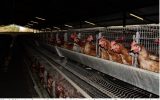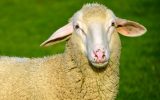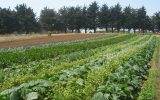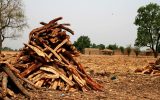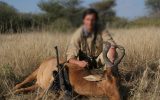Bush-based animal feed production is a viable option for Namibian farmers, especially in times of drought. “Farmers can diversify their income and sustainably contribute to tackling bush encroachment. They can ensure a more productive use of their land. We see a big opportunity for our farming community and for land users in this value chain,” says Progress Kashandula, General Manager of the De-bushing Advisory Service (DAS). To support farmers, the organisation has been conducting a series of trainings across Namibia with a focus on bush encroached regions. The next round of trainings will take place in the northern parts of the country, in Otjetjekua on the 8th July, Amarika on the 9th July and Okambali on the 11th July.
At the trainings, farmers learn about key principles of bush to animal feed production and get insights into the practical production process. The use of basic tools, which are readily available on farms, such as pangas and axes, is demonstrated. It is not necessary to procure expensive machinery to produce animal feed.
In addition, as part of its capacity development efforts, DAS has launched a capacity development project focused on bush control, biomass utilisation and entrepreneurship targeted at officials working in the bush control and biomass utilisation sector and for unemployed, young graduates of natural resource management studies. This initiative is about to be piloted with theoretical and practical trainings scheduled to take place in July and August in Okahandja at the Andreas Kukuri Conference Centre and a nearby farm. Afterwards, trainees will be mentored over a number of months so that they can gain hands-on experience in passing the knowledge on.
Despite the challenges, it is proven that when done right, animal feed can be a solution to the current drought situation. A study conducted by the Ministry of Agriculture, Water and Forestry, the GIZ Bush Control and Biomass Utilisation (BCBU) project and the UNDP Sustainable Management of Namibia’s Forested Land (NAFOLA) project showed in 2017 that bush-based animal feed production is a viable and promising concept. Results from intensive trials demonstrates that bush feed can be used not only as an emergency drought feed, but also as a supplementary feed throughout the year and in feedlots.
Not surprisingly, farmers have expressed great interest across the country. “We have conducted bush-based animal feed production trainings in various regions of the country to ensure inclusivity and cater to the different environmental conditions that differ from region to region. We want to support the Namibian government’s state of emergency declaration on the current drought,” Progress Kashandula explains.
To roll out the knowledge effectively, DAS is working with local partners. Trainings in the Otjozondjupa region were held in collaboration with the Communal Land Development Programme, Okamatapati Farmers Association, Okakarara Farmers Association, the Councillor’s office and other partners. “Involving the local authorities has been key to the success of this initiative,” Kashandula points out. Hon. Cornelius Kanguatjivi, Councilor of Epukiro Constituency commended the project for involving local communities and local authorities: “Through such partnerships, people in remote areas such as Epukiro can benefit from these services. This was an eye-opener and we really appreciate your initiative for coming to us,” he said.
The trainings are conducted by Dagmar Honsbein, on behalf of the De-bushing Advisory Service.
The De-bushing Advisory Service is a national knowledge broker on bush control and bush encroachment and works closely with existing agricultural and extension service on mainstreaming capacity for bush control and biomass utilisation. For more information on their work, please visit their website at www.dasnamibia.org.






